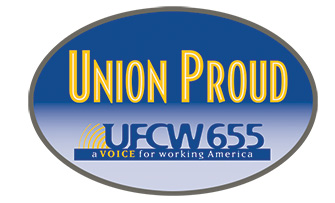
By DAVID A. COOK
President
 Too often I have to use this space to talk about something that isn’t going well. Whether it’s a job action or a breakdown in negotiations or an employer not doing right by their workers, I find myself frequently using this space to draw attention to our fights and our struggles in the Labor Movement.
Too often I have to use this space to talk about something that isn’t going well. Whether it’s a job action or a breakdown in negotiations or an employer not doing right by their workers, I find myself frequently using this space to draw attention to our fights and our struggles in the Labor Movement.
VICTORY AT GOODWILL
Today, I am fortunate enough to buck that trend a little bit. Today, I am happy to report that employees at the Goodwill store in Festus became the first Goodwill employees in Missouri to officially adopt a union contract nearly 20 months after originally voting for union representation.
It has been a long struggle for these folks. Since their union campaign and all the way through negotiations I have frequently used this space to document the journey. Their historic victory in voting for representation was a moment of celebration both among the workers and right here at Local 655. Their fight for a union contract — despite an employer willing to do almost anything to resist one — was long. There were times it might have seemed truly hopeless for them.
Union organizing is extremely challenging work in today’s world. It can be enormously taxing both physically and emotionally, and it tends to require great patience. In the modern Labor Movement it is not unusual for organizing campaigns to take years to go from first union contact to first union contract, and the more employees there are, the longer it can take.
During that time, you have to work hard, and employees have to keep their spirits up, and having a little good luck never hurts. I have to credit our hard-working staff, particularly our organizers, for never giving up on Goodwill workers or their fight to organize.
Of course, the real thanks goes to the workers themselves, who had a clear vision of a better life and a better workplace and knew they could achieve it if they focused and didn’t surrender. My hat goes off to them and to all the energy they poured into this effort. Any organizer will tell you: the first contract is always the hardest. We got there in the end, but it sure wasn’t easy.
PROTECTING THE RIGHT TO ORGANIZE
Organized Labor won’t have a future if we don’t find more ways to organize new workers like this. I am coming to the end of my time in Labor and as I look to the future of this organization, and the future of the Labor Movement as a whole, I can’t help but consider how critical organizing will be, and how we have to continue to search for new and better ways to do it.
One thing we need to consider is how the law makes organizing nearly impossible and gives all the power to employers. Thankfully we may see some progress on that front.
The PRO Act has already been passed by the House, and President Joe Biden is urging the U.S. Senate to pass the bill as well. The bill has a lot in it, but one of its most important functions is that it helps tip the scales back to balance and makes it easier for workers to choose to form a union. Changes like that to the law could help the Labor Movement have a brighter future.
Labor has experimented with different methods of organizing over the years, and this Local has been part of that grand experiment, but no one has the answer just yet. There probably isn’t a single magical formula, but we have to keep experimenting.
WE NEED YOU TO START THE CONVERSATION
One of the most valuable tools in this process could be you, the reader. If you’re reading these words right now, then it’s probably safe to say that you’re a supporter of Organized Labor and unions. It’s probably also safe to say that you’ve directly benefited from a union in your lifetime.
What would it take for someone like you to engage a friend, family member, or neighbor in a discussion about your positive experience with unions? What would it take for you to talk to the non-union person in your life that you think would benefit from organizing?
These are the conversations that can create campaigns and movements, when non-union workers begin to hear how their lives could be improved, or how their workplace can get better.
These are the conversations that begin whispered discussions in breakrooms and become lengthy meetings over a beer or coffee at a local spot as workers begin to understand their own power.
As Local 655 and others like us begin to focus on ways to use technology to our advantage to win organizing campaigns, and as we look to legislative advocacy to change the laws in our favor, organizing still comes down to those conversations.
We will continue to find new ways to win, but we need your help along the way. Do the Movement a favor and invest in the future of Labor by talking about its value with someone you know. You never know, you might start a movement.

